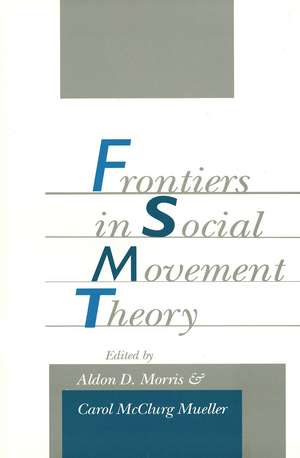Frontiers in Social Movement Theory
Editat de Aldon D. Morris, Carol McClurg Muelleren Limba Engleză Paperback – 26 aug 1992
Social protest movements such as the civil rights movement and the gay rights movement mobilize and sustain themselves in ways that have long been of interest to social scientists. In this book some of the most distinguished scholars in the area of collective action present new theories about this process, fashioning a rich and conceptually sophisticated social psychology of social movements that goes beyond theories currently in use.
The book includes sometimes competing, sometimes complementary paradigms by theorists in resource mobilization, conflict, feminism, and collective action and by social psychologists and comparativists. These authors view the social movement actor from a more sociological perspective than do adherents of rational choice theory, and they analyze ways in which structural and cultural determinants influence the actor and generate or inhibit collective action and social change. The authors state that the collective identities and political consciousness of social movement actors are significantly shaped by their race, ethnicity, class, gender, or religion. Social structure--with its disparities in resources and opportunities--helps determine the nature of grievances, resources, and levels of organization. The book not only distinguishes the mobilization processes of consensus movements from those of conflict movements but also helps to explain the linkages between social movements, the state, and societal changes.
The book includes sometimes competing, sometimes complementary paradigms by theorists in resource mobilization, conflict, feminism, and collective action and by social psychologists and comparativists. These authors view the social movement actor from a more sociological perspective than do adherents of rational choice theory, and they analyze ways in which structural and cultural determinants influence the actor and generate or inhibit collective action and social change. The authors state that the collective identities and political consciousness of social movement actors are significantly shaped by their race, ethnicity, class, gender, or religion. Social structure--with its disparities in resources and opportunities--helps determine the nature of grievances, resources, and levels of organization. The book not only distinguishes the mobilization processes of consensus movements from those of conflict movements but also helps to explain the linkages between social movements, the state, and societal changes.
Preț: 406.22 lei
Nou
Puncte Express: 609
Preț estimativ în valută:
77.73€ • 81.37$ • 64.32£
77.73€ • 81.37$ • 64.32£
Carte tipărită la comandă
Livrare economică 07-21 aprilie
Preluare comenzi: 021 569.72.76
Specificații
ISBN-13: 9780300054866
ISBN-10: 0300054866
Pagini: 400
Dimensiuni: 156 x 235 x 27 mm
Greutate: 0.58 kg
Ediția:New.
Editura: Yale University Press
Colecția Yale University Press
ISBN-10: 0300054866
Pagini: 400
Dimensiuni: 156 x 235 x 27 mm
Greutate: 0.58 kg
Ediția:New.
Editura: Yale University Press
Colecția Yale University Press












